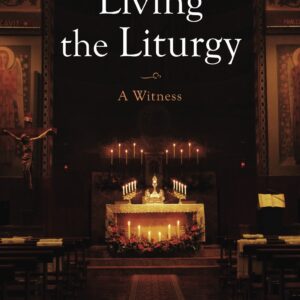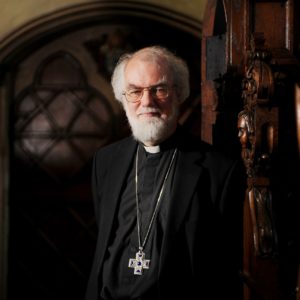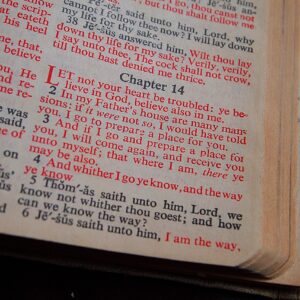Each Lent, my wife and I read aloud Christ on Trial: How the Gospel Unsettles our Judgement, by former Archbishop of Canterbury Rowan Williams. This brilliant book is, in part, a close reading of the scenes in each of the four Gospels where Jesus is on trial before the authorities. But it’s not only a close-reading of texts. The close-reading of texts is meant to stimulate a close-reading of hearts, the readers’ own. It does so by “unsettling our judgment.”
Because of his literary and theological background, Williams is the perfect close reader of these scenes. And because of his pastoral background, he’s the perfect translator of the close reading of words into the close reading of hearts as well. His question to each of the Gospel scenes is, then, two-fold: where does Jesus stand in relation to the world around him? and — the “unsettling” challenge to each of us — where do we stand in relation to Jesus as the victim on trial?
First, Mark’s Gospel. In Williams’ reading, Mark’s whole Gospel depicts a nightmare world where no one understands the significance of Jesus’ teachings and healings. Jesus repeatedly tells people to say nothing about his works — because, says Williams, the language available, a language of worldly power and violence, is inadequate to speak about God’s utterly different power. When Jesus breaks the Gospel’s silence about who he is — answering the high priest’s question of his identity in the words with which God identifies himself in the Hebrew Scriptures, “I am” — we see Mark revealing where God is. God stands in the place of the victim who doesn’t try to justify himself in terms of success as the world sees it.
And what about us? Where do we stand in relation to Mark’s Jesus? People who stand with Jesus, Williams says, are those who, when necessary, “make gestures and take stands, not for the sake of… any result that might be guaranteed, but because there is simply nothing else that can be done with honesty.”
Williams then reads Matthew’s trial scene as a test of the “entire system of religious language” as spoken by religious authorities. Caiaphas challenges Jesus to “tell us if you are the Messiah, the Son of God.” But what, Williams asks, “do words like ‘God’ and ‘anointed’ mean in the mouth of the High Priest?” Jesus’ reply — “You say so” — turns the questioning back onto the questioner, asking in effect “Do you know yourself, your history? Do you really inhabit the words and the forms you use so fluently?”
But for Williams, it isn’t only about how Caiaphas uses religious language. It’s about how we do. We need traditional doctrine, Williams says, not to distance ourselves from Jesus, as Caiaphas does, but “to hold us stillbefore [him]”—and by doing so “to create a depth in us, a space for radical change in how we think of ourselves and how we act.” But we must be careful to avoid an attitude “of ownership where the words and images of faith are concerned.” For the danger is that the familiar words of our faith “may come to represent not what they are supposed to be about but the power of the speaker and the powerlessness of others.”
Moving on to Luke’s Gospel, Williams reads it as an effort to shift our notion of where transcendence lies. For Luke, in this reading, God’s transcendence is “present in and with those who do not have voice, in and with those without power to affect their world… not because they are naturally virtuous” but simply “in the fact that they are ‘leftover’.” That is, God appears in the very fact that our world is arranged to always leave out of account “someone’s interest, welfare or reality.”
For Luke, then, the transcendent resides not just with Jesus in his lonely failure “but also with the voiceless and powerless of this world”—with whom Luke challenges us to stand. Even further, Luke’s challenge is “to find in ourselves the poverty and exclusion we fear and run away from in others.” Williams concludes: “The truth about Jesus which the courts seek becomes more and more obviously something that raises the question of how we are going to be truthful about ourselves.”
Of course, talking about “truth” segues us nicely into John’s Gospel. Truth, for John, isn’t so much a philosophical question as a question about authority. Jesus is constantly undermining accepted definitions of power as well as the kinds of reality shaped and sustained by power. In this sense, as Williams puts it, “You could read the whole of John’s Gospel as a trial story. Again and again, Jesus is exposed to hostile questioning.” So it’s no surprise that at the trial itself, Pilate’s “What is truth?” is part of an interrogation whose focus is, very explicitly, authority. “Are you a king?” Pilate asks, incredulously. For if Jesus is a king, how, asks Williams, “is Pilate to imagine an authority that is not conceived in ethnic or political terms?”
Pilate’s trial and his own self-condemnation—for as Williams points out, John’s trial is more about Pilate than about Jesus—now becomes our own. Where do we place authority? “If your ‘home,’” Williams says, “is a confidence in the status secured by race or power, you are not free and so not truthful, and therefore a prey to those temptations that drive people to violence.” Instead, “The Christian task… is to try and see situations without the colouring of these worldly habits, to see them fresh, to see the flesh and blood of the moment, not the ideologies that draw our gaze away.”
And yet, and yet… despite the power of Williams’ persuading us, through his close readings, to step down from the tribunal at Jesus’ trial to stand with him in the dock, does that power alone compel us to do so? Is any close reading of Gospel texts, even a reading as deft and sensitive as this one, sufficient to lead us where Williams—echoing the Gospel writers themselves—indicates we need to go: to Jesus’ side?
Williams himself must not have thought so. The proof of this is that he ends each chapter with reflection questions and a prayer. His close reading of texts initiates a process that must continue not merely in a different medium—in the heart more than the mind—, but also under different guidance, Jesus’ own. Close reading of texts we do with each other, because we depend on each other to sharpen our sense of how words create meaning. But how deeply each of us responds to that meaning requires dialogue in which God is the ultimate partner. Williams leads us beautifully as far as he can. And then he gives us over to the One who can truly read hearts.
After getting his PhD in English literature, George Dardess taught close reading to his own students until his retirement. Since then he has been ordained a Deacon in the Roman Catholic Church and written several books on Muslim-Christian relations.





